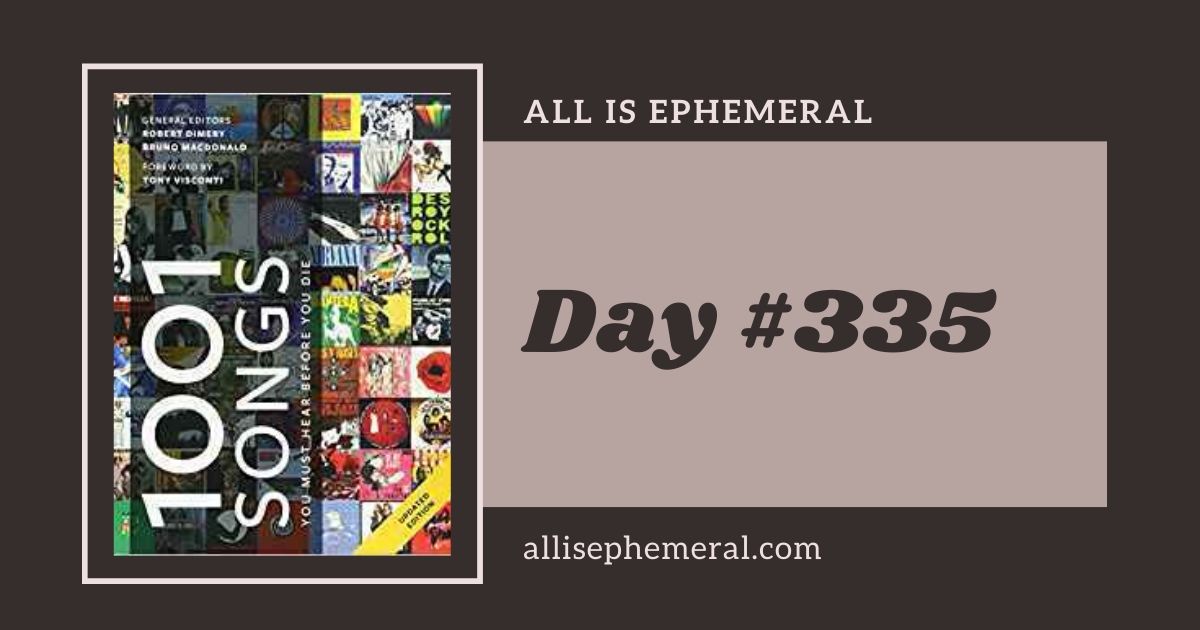
1001 Songs Challenge #334: The Revolution Will Not Be Televised (1971)
 On 11 February 2019 I set myself the challenging of reading 1001 Songs You Must Hear Before You Die by Robert Dimery (ed.) and following the book’s advice to the letter. I’ve previously read 1001 Films… and started 1001 Albums… but felt 1001 Songs… would be a sensible place to start for what I have in mind here.
On 11 February 2019 I set myself the challenging of reading 1001 Songs You Must Hear Before You Die by Robert Dimery (ed.) and following the book’s advice to the letter. I’ve previously read 1001 Films… and started 1001 Albums… but felt 1001 Songs… would be a sensible place to start for what I have in mind here.
My challenge is to read about one song per day and listen to it (YouTube and Spotify, I need you tonight!) before sharing my own thoughts. Some songs I will love, others I’ll hate, and I’m sure there will be those that leave me perplexed but listen to them I shall.
I’ll also try, and most likely fail, to pinpoint the best song from the 1001 on offer but I’m nothing if not foolhardy. Instead of one song, I’m predicting I’ll have about 100 favourites by the end and may have to resort to a Top 10 so far to maintain any semblance of sanity.
of one song, I’m predicting I’ll have about 100 favourites by the end and may have to resort to a Top 10 so far to maintain any semblance of sanity.
So long as I post everyday (including Christmas) then this challenge should come to an end on Wednesday 8 November 2021. Staying with the Barney Stinson theme I am hoping that the whole experience will prove to be…
Gil Scott-Heron – The Revolution Will Not Be Televised (1971)
Continuing in the US, we are heading to Chicago today, dear reader. We have something a little different in the form of a jazz and soul poet by the name of Gil Scott-Heron who delivered spoken word pieces rather than singing. Previously on the blog we had The Last Poets with When the Revolution Comes which was in a similar vein. In 1971, Scott-Heron’s response to that piece came with The Revolution Will Not Be Televised, once a slogan used in the 1960s Black Power movements.
In The Revolution Will Not Be Televised we do have background music albeit faint as our focus needs to be on Scott -Heron’s words here. He talks about various TV commercials and shows and uses these as examples of media pieces that will not cater for a revolution for black Americans, they will not be broadcasting such an event. He appeals to people waiting for a revolution to not sit at home and expect it on TV because it will be nowhere to be seen. Scott-Heron insists that the only way a revolution will come to make life better for black Americans is for it to be live i.e. people need to be out on the streets as a part of it, making it happen, because it won’t ever be on the television if everyone simply waits for it.
-Heron’s words here. He talks about various TV commercials and shows and uses these as examples of media pieces that will not cater for a revolution for black Americans, they will not be broadcasting such an event. He appeals to people waiting for a revolution to not sit at home and expect it on TV because it will be nowhere to be seen. Scott-Heron insists that the only way a revolution will come to make life better for black Americans is for it to be live i.e. people need to be out on the streets as a part of it, making it happen, because it won’t ever be on the television if everyone simply waits for it.
Gil Scott-Heron’s work is considered a precursor to rap and hip hop and you can see how those genres would link to him and be inspired by what he did. The Revolution Will Not Be Televised is 3+ minutes of hard hitting reality for those that listen to it. It represents an America where racial divisions continued to be a scourge on society just as they remain to this day and not just in the US. I remain dumbfounded by racism, have never understood the need for it or what motivates people to have such hatred for another human being based n the colour of their skin. Despite the civil rights movement, black communities across the world continue to face racism, violence and prejudice. Sadly, Scott-Heron died in 2011, having been HIV positive for many years, but his work here remains more relevant than ever.
Favourite songs so far:
The Animals – House of the Rising Sun (1964)
Simon & Garfunkel – The Sounds of Silence (1965)
The Beach Boys – God Only Knows (1966)
The Doors – The End (1967)
The Beatles – A Day in the Life (1967)
The Kinks – Days (1968)
Derek & The Dominos – Layla (1970)
David Bowie – Life on Mars? (1971)
Rod Stewart – Maggie May (1971)
Led Zeppelin – When the Levee Breaks (1971)





